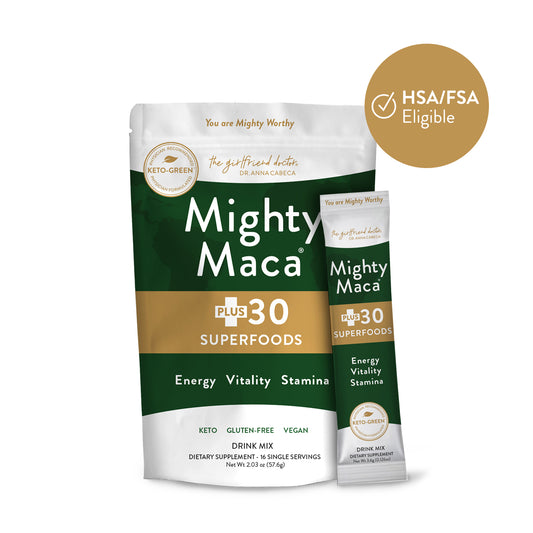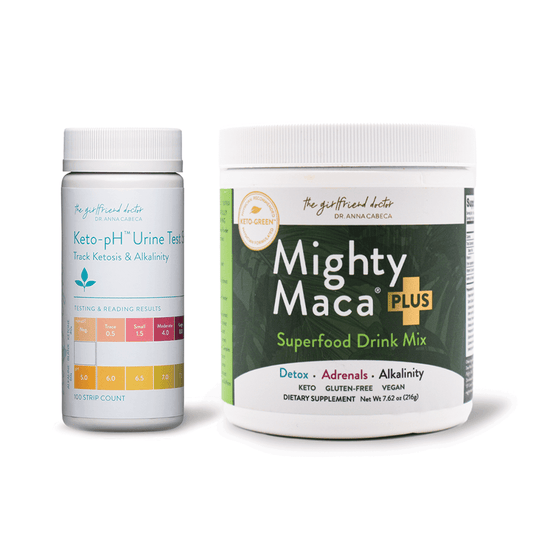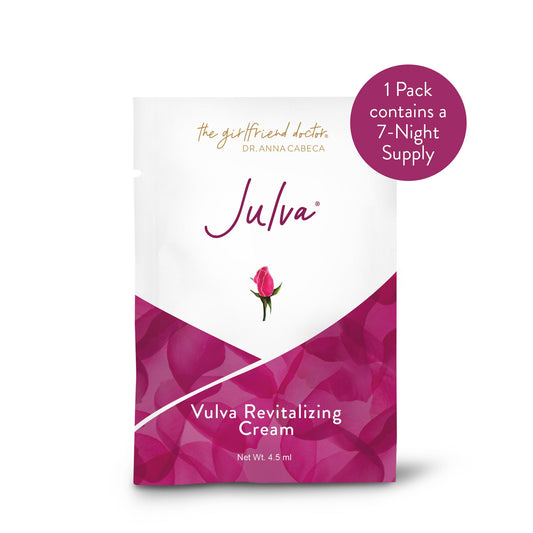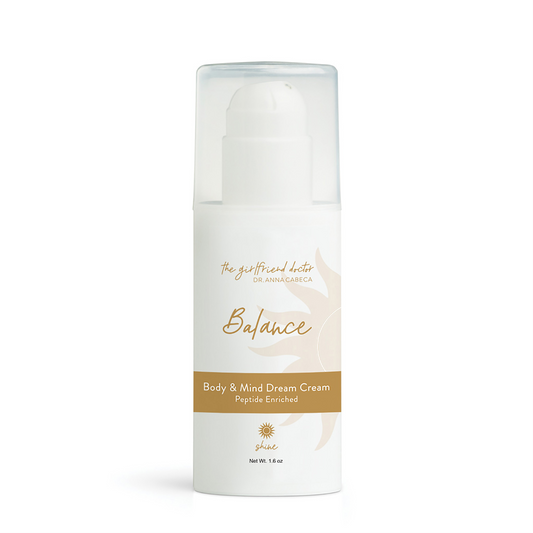It’s one of the simplest things you can do to balance your hormones: hydrate your body properly. Especially during menopause, and especially when you’re dealing with headaches, weight gain, and blood sugar issues. How do you know if you’re drinking enough water? Here are 10 signs you don’t drink enough water.

Dehydration And Menopause
When we talk about dehydration, it usually conjures images of severe thirst. Like a traveler lost in the desert, right?
But mild dehydration often looks less like a stranded castaway and more like:
Fatigue
Hunger
Dry Skin
Headaches
Digestive Issues
Dehydration also means complications for your hormones, especially when you’re menopausal and perimenopausal.
For one thing, when you’re dehydrated, your liver has trouble detoxifying your body. That means hormones (especially estrogen) and toxins don’t leave the body — they get absorbed back into the blood stream. This can lead to estrogen dominance in menopause, because even though estrogen levels are declining, they aren’t declining as rapidly as progesterone levels are. Cue the hot flashes, weight gain, and headaches.
Drinking more water is crucial for your hormones and can help your entire body, from your blood sugar and blood pressure to your kidneys, too. Are you getting enough?
Let’s dive in and take a look at 10 signs you don’t drink enough water.

1. The Hot Flashes And Night Sweats Won’t Stop.
Hot flashes and night sweats are a pain, there’s no doubt about it. And dehydration can exacerbate them. Your body needs adequate fluids to regulate your body temperature, so when you skip the water, you’re depriving your body of what it needs to keep hot flashes at bay.
And, when you do have hot flashes, you lose more water because you’re sweating. Be sure to up your water intake when you have an episode.
For additional hot flash support, throw a scoop of Mighty Maca into your water while you’re at it. You won’t regret it!

2. Vaginal Dryness Is Your Constant Companion.
Yes, dropping hormone levels play a huge role in vaginal dryness. But so does inadequate hydration. Your skin needs plenty of water to remain plump, and that’s all of your skin, from your face to your vagina. So be sure to hydrate, hydrate, hydrate for glowing skin, fewer wrinkles, and juicier vaginal tissues.
Have you tried Julva® yet? It’s my patented cream that rejuvenates your vagina and vulva. Try it for FREE > here.

3. You Feel Tired. All The Time.
Fatigue is just part of life after a certain age, right?
Wrong.
While water won’t fix all of your energy problems, dehydration can be a contributing factor to that feeling of exhaustion that follows you around all day. Proper hydration improves blood flow and circulation, which is crucial for optimal energy.

4. The Joint Pain Is Real.
Joint pain and stiffness often come along with hormonal changes during perimenopause and menopause. After all, pretty much every tissue in your body is changing and feeling the lack of sex hormones that used to be so prevalent.
Dehydration makes things worse. Without hydration, your body can’t produce the fluids it needs to lubricate your joints. Dehydration can also make your body pull water from your cartilage (which is mostly made up of water!) As you can imagine, this makes your cartilage feel all stiff and achy, which is part of the whole joint pain situation you’re experiencing. Bottom line: drinking more water is a must if your joints are bothering you.

5. You’re Gaining Weight.
Yet another unwelcome symptom of dehydration is weight gain.
Without proper water intake, your metabolism can slow. Which also means drinking more could help speed it up a bit. In fact, one study showed that 500ml of water intake helped to increase metabolism by a whopping 30%. (1) And, when you drink water, you feel more satisfied and fuller, which leads to less food intake. So if you’re struggling with menopause weight loss, this is one of those simple things you can do to help.

6. Your Blood Sugar’s Becoming A Problem.
We know that insulin resistance is a huge problem for menopausal women. It makes it nearly impossible to lose weight, it’s terrible for your heart, and if left unchecked, it leads to type 2 diabetes.
One way you can combat insulin resistance and high blood sugar is to hydrate properly. Studies have repeatedly linked hydration to lowered risk of type 2 diabetes. (2) So, if that’s not a reason to start drinking more, I don’t know what is.

7. You’re Constipated.
Hormonal changes during menopause can slow down the digestive system, leading to constipation and bloating. Not fun.
And, when you don’t drink enough water, this can further slow digestion and exacerbate these gastrointestinal issues. Plus, we want to get excess hormones out of the body, and one of the ways you eliminate them is through your bowels. Drink that water, and get the digested food out of your digestive tract more easily.

8. Headaches Are Making You Miserable.
Headaches and migraines often plague women in perimenopause and menopause. This is usually due to an increase in inflammation and estrogen dominance. Remember, we want to flush excess estrogen and toxins out of the body. Water helps that happen.
Plus, there appears to be a relationship between hydration and headaches. While dehydration itself can trigger a headache, it also can exacerbate other conditions which in turn cause headaches. (3) Best to stay hydrated just in case.

9. You’re Bloated And Puffy.
For one thing, dehydration makes you constipated, as we discussed above. That can certainly make you feel bloated.
Then there’s the fact that when you’re dehydrated, your pituitary releases vasopressin, also known as antidiuretic hormone. It’s job is to instruct the kidneys to hold onto water at all costs. (4) That can make you look and feel bloated. So even though it may seem counterintuitive, if you’re bloated, you need to drink *more* water.

10. You Pee When You Laugh, Sneeze, Or Cough.
A lot of women limit their fluid intake when they suffer from urinary incontinence. Which makes sense, in theory. But dehydration actually makes the leaking worse. Plus, it can exacerbate urinary tract infections as well, which often start to increase in frequency as you age and your vaginal tissues become thinner.
Bottom line, Girlfriend, you have to drink more water!
I prefer plain water, but if you don’t like the taste, you can always punch it up with a squeeze of fresh lemon or lime.
What Happens If You Don’t Drink Enough Water Long Term?
It’s not just your hormones that are affected when you skimp on regular water intake, either. When you don’t drink enough water long term, you may start to experience things like:
Kidney stones and kidney damage
Cardiovascular problems
Brain fog and concentration issues
Skin challenges, including eczema
This is why it’s so important to make sure you’re hydrating properly, without fail, every day.
It’s one of the reasons I formulated my Mighty Maca® as a drink mix. It makes it so easy to prioritize a nice, tall glass of water in the morning — you just add a small scoop of it to your favorite beverage and boost hydration, support your hormones, crush hot flashes, and get in dozens of superfoods. It’s the morning ritual I never, ever skip.
10 Signs You Don’t Drink Enough Water: My Final Thoughts
Water, and plenty of it, is your secret weapon for hormone support.
It’s nearly free.
It’s simple.
And it helps your entire body, from your blood sugar and weight to your heart and your brain. I hope this article has convinced you that it’s time to start prioritizing your water intake, Girlfriend.
I always recommend drinking at least 60-70 ounces of water as early as possible in the day — and more if you’re exercising or it’s really hot outside. I say as early as possible because you don’t want to spend the night running to the restroom.
Ideally, I like to split this up and have four glasses of water in the morning and four glasses in midafternoon. That way, you get your water intake out the way early, it’s done and you don’t have to worry about things coming up that prevent you from crushing your water-drinking goals.
I also highly recommend that you drink filtered water, since there’s so many questionable contaminants in tap water, including endocrine disrupting chemicals, which make hormone imbalance worse.
And if you really want to kick your water up a notch, add in a scoop of Mighty Maca for a superfoods boost that helps battle all of your trickiest menopause symptoms.
Try it and see for yourself why it has over 1500+ 5-star reviews.










